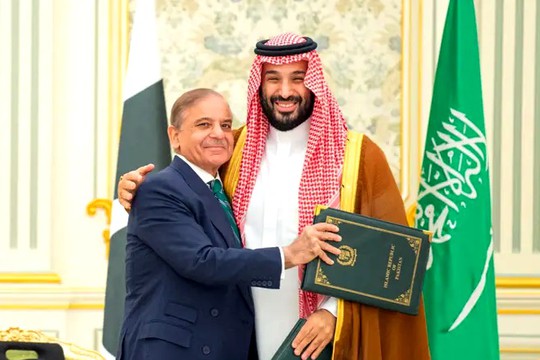Saudi Arabia and Pakistan on Wednesday signed a joint strategic defense agreement during Prime Minister Shehbaz Sharif’s visit to Riyadh.
Photo: english.alarabiya.net
A beaming Pakistani Prime Minister Shehbaz Sharif – welcomed with Saudi F-15 fighter jets, a red carpet, and full royal protocol – joined Saudi Crown Prince Mohammed bin Salman on Wednesday to sign a “strategic mutual defence agreement” (SMDA), ‘Al Jazeera’ writes.
Observers say it is a landmark moment in the decades-old alliance between the two nations whose ties stretch back nearly eight decades.
The signing ceremony at the Royal Court in Al-Yamamah Palace in Riyadh was witnessed by senior officials from Saudi Arabia, the custodian of two of Islam’s holiest sites, alongside representatives from Pakistan, the Muslim world’s only nuclear power.
The deal comes at a critical moment. Regional politics have been upended by two years of Israeli aggression – including its war on Gaza and strikes on neighbouring states – capped by last week’s Israeli attack on Doha, Qatar’s capital, which borders Saudi Arabia.
But it also comes amid heightened tensions between India and Pakistan, after a short but intense conflict in May in which they struck each other’s military bases over four days, taking South Asia to the brink of a full-fledged war between nuclear-armed neighbours.
Pakistan’s Ministry of Foreign Affairs said the agreement with Saudi Arabia reflects the “shared commitment” of both nations to strengthen security and promote regional peace, while also pledging to “strengthen joint deterrence against any aggression”.
“The agreement states that any aggression against either country shall be considered an aggression against both,” the ministry said.
Asfandyar Mir, a senior fellow at the Washington DC-based Stimson Center, described the pact as a “watershed” for both countries.
“Pakistan previously maintained mutual defence treaties with the United States during the Cold War, but they crumbled by the ’70s. Even with China, despite extensive defence cooperation, Pakistan lacks a formal mutual defence pact,” Mir told Al Jazeera.
Muhammad Faisal, a South Asia security researcher at the University of Technology Sydney, said the deal could serve as a template for Pakistan to engage in similar bilateral defence cooperation with the United Arab Emirates and Qatar, two key Gulf partners.
Historic bonds and military cooperation
Saudi Arabia was one of the first countries to recognise Pakistan after its independence in August 1947. In 1951, the two nations signed a “Treaty of Friendship,” laying the foundation for decades of strategic, political, military, and economic cooperation.
Over the years, Pakistani armed forces have deployed to the kingdom several times and trained Saudi personnel both in the Gulf and in Pakistan.
But the latest pact arrives as the Middle East’s geopolitical chessboard is in flux. The fallout from Israel’s war on Gaza and its strikes on regional neighbours has made Gulf states uneasy, many of which still rely heavily on United States security guarantees, even as Washington remains Israel’s closest ally.
Qatar, attacked by Israel on September 9 for hosting Hamas leaders, serves as the forward headquarters for US Central Command (CENTCOM).
As of mid-2025, some 40,000–50,000 US troops are stationed across the Middle East, deployed in large bases and smaller forward sites – at least 19 of them – including Prince Sultan Air Base outside Riyadh.
While Saudi officials say the deal with Pakistan has been in the works for at least a year, Sahar Khan, an independent security analyst in Washington, DC, said its language will raise eyebrows in the US.
“Pakistan already has a credibility problem in Washington, and this agreement won’t reduce it,” Khan told Al Jazeera.
Khan said that it is in Pakistan’s interest to clarify that its nuclear and missiles programme is India-centric, and while its bilateral relations with Saudi Arabia remain strong, “it will not fight Saudi wars but instead, will only provide relevant support”.
A region on edge
Earlier this year, in June, Israel waged a 12-day war with Iran, targeting nuclear facilities as well as senior civilian and military leaders. American bomber jets supported the assault, dropping massive bunker-buster bombs on Fordow, one of Iran’s key nuclear sites.
Three months later, Israel struck a building in a leafy Doha neighbourhood that is home to embassies, supermarkets and schools, killing at least five Hamas members and one Qatari security official.
The Doha attack triggered an emergency meeting of Arab and Islamic nations. Gulf Cooperation Council (GCC) states – Bahrain, Kuwait, Oman, Qatar, Saudi Arabia, and the UAE – said they would activate a joint defence mechanism.
Faisal said the Pakistan-Saudi pact should be viewed through the lens of these developments.
“These events have exacerbated security anxieties of the Gulf states while jeopardising confidence in the US security umbrella as the ultimate shield. As Gulf states look to bolster their security, regional countries such as Pakistan, Egypt and Turkiye emerge as natural partners,” he said.
Khan, however, said that while the timing of the pact does suggest a link with Israel’s recent attack on Qatar, “such kinds of agreements take months, if not years, to negotiate”.
Pakistan’s nuclear shield over Saudi Arabia?
Saudi Arabia has long expressed interest in acquiring nuclear technology for civilian use, to diversify from fossil fuels.
In January, Saudi Energy Minister Prince Abdulaziz bin Salman Al Saud reiterated Riyadh’s readiness to enrich and sell uranium, a key component of nuclear programmes.
But Saudi Arabia has also repeatedly made clear that it does not seek to pursue nuclear weapons.
Still, Khan, the analyst, said some things were unclear about the ambit of the agreement signed between Pakistan and Saudi Arabia.
“The pact will trigger a new alliance politics around what it does or does not cover, deterrence, resource commitment, operational details, among others,” he said. However, he added, that does not diminish the political significance of this pact being struck.
“It’s a huge development for both countries.”
read more in our Telegram-channel https://t.me/The_International_Affairs

 11:11 19.09.2025 •
11:11 19.09.2025 •























